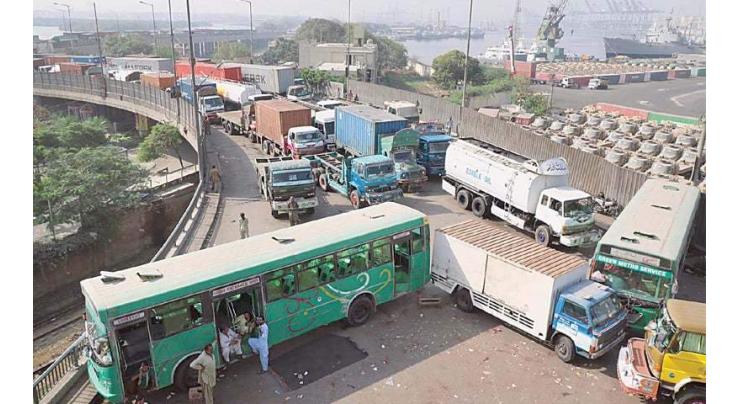
A Regulated Road Traffic Reflects A Nation's Self-discipline By Naveel Ahmed
Umer Jamshaid Published January 18, 2019 | 05:19 PM

A glimpse of a regulated road traffic is enough to ascertain a nation's self-discipline that flows smooth like a country's unhindered progress
ISLAMABAD, (UrduPoint / Pakistan Point News - 18th Jan, 2019 ) :A glimpse of a regulated road traffic is enough to ascertain a nation's self-discipline that flows smooth like a country's unhindered progress.
World over, the developed countries have embraced scientific road management to address growing traffic challenges. However, with Islamabad as a mirror to the entire country's traffic management system, the reflection is not that good.
The city is braving several challenges mainly the absence of innovative methods to tackle chronic traffic congestion, poor road infrastructure to ensure uninterrupted mobility of plying vehicles.
Three key stakeholders- Islamabad Traffic Police (ITP), Capital Development Authority (CDA) and public- which play crucial role in ensuring hassle and risk free traffic movement in Islamabad owe their own complex sets of reasons resulting into traffic system's catastrophic failure.
The ITP, an efficient force established in 2005 to ensure regulated movement of vehicles on city's thoroughfares, requires a revamp as it is currently operating with 628 officials, less instruments to cope emergency situation and minimal challenging amount," said a top official of ITP.
Highlighting the ITP's issues, the official said, his staff works 14 hours to deal with huge traffic influx on main arteries surged by 700 times during the last decade, traffic jams during peak hours, markets' blockades due to illegal parking and VIP movements.
He underlined the need for enhancing challan amount as deterrence against violators proved effective to bring behavioural changes in them.
"We can issue only Rs 500 against major violation", he regretted.
He also urged upon CDA to install traffic related road furniture as enforcement necessitates road signs, warning boards, zebra crossing and updated lane marking.
CDA was supposed to facilitate the ITP regarding every help sought ranging from upgradation of the capital's road infrastructure including construction of roads, underpasses, overhead bridges, signal free facilities to installation of road furniture.
The "Future Planned Projects" placed on the list of development schemes for the city in January 2017 pertaining to road infrastructure could not be materialized due to bureaucratic snags and technical issues.
Overpasses on Nazim-ud-Din Road and Fazal-e-Haq Road over Faisal Avenue (700m); underpass at the Shakarparian Intersection on Islamabad Highway; interchange at intersection of 9th Avenue and Jinnah Avenue; interchange at I.
J.P Road and 9th Avenue; interchange at Koral Chowk on Islamabad Express way and others.
CDA, when contacted by APP for stalled projects, it had own reasons. According to it,the shortage of funds and bureaucratic snags were the main impediment behind stalled project.
Last but not the least, public who always appears in haste while commuting on roads, mostly seems violating the traffic rules and regulations with impunity.
A commuter Sajjad Abbasi suggested that a violator must be fined heavily . He floated the suggestion to follow Punjab government's footsteps which takes lead in taking such effective measures.
He urged the ITP to tighten noose around lane violators by introducing strict penalty against such law breakers.
Traffic rules and regulations should be made mandatory like education curriculum.
Deputy Inspector General (DIG) National Highways and Motorways Police, Ashfaq Ahmad urged the CDA to build overhead bridges and underpasses in the Federal capital as these prevent deadly accidents.
Proposing the practical measures to place the capital's messy traffic congestion, he said it could be managed by the authorities concerned by adopting scientifically approved guidelines.
He said the authorities concerned should totally prohibit buses terminals' functioning in the city's areas and only allow them to operate near the long intra-cities belts (Grand Trunk Road, Motorways and Highways) by diverting Heavy Traffic Vehicles from the city's central area.
He emphasized the need to promote public-friendly local transports within the city.
Sharing an example being practiced in the central London to compel daily commuters to use public mobility mode, he suggested to impose heavy taxes on entry of personal vehicles at their arrival to the federal capital to tap their flow within the city.
The depicted picture of the federal capital's unruly traffic system is in dire need of a complete overhaul and signals warning to bring revolutionary changes otherwise the capital's dwellers continue to suffer from daily traffic clogs whether commuting to college, offices, school and other destinations.
Related Topics
Recent Stories

Experts raise concerns over introduction of 10-stick packs

Iranian president arrives in Karachi

Law Minister expresses Govt's resolve to address issue of missing persons

Rizwan’s batting order may be changed: Sources

Nawaz Sharif to visit Guangzhou exhibition in China

FM Dar not traveling to China: Foreign Office

PM takes notice of deliberate delay in tax cases

Iranian President visits Allama Iqbal’s mausoleum

Iranian President arrives in Lahore today

Currency Rate In Pakistan - Dollar, Euro, Pound, Riyal Rates On 23 April 2024

Today Gold Rate in Pakistan 23 April 2024

Islam enlightened world with its teachings about knowledge: Dr Jamileh
More Stories From Pakistan
-
PILDAT delegation visits KPCVE
9 minutes ago -
Operation against profiteers, hoarders continues
10 minutes ago -
Agriculture, IT sectors hold potential to contribute significantly to country's economic growth: Min ..
10 minutes ago -
Board adopts zero tolerance policy against cheating mafia: Chairman RBISE
10 minutes ago -
Dry weather forecasts for northern Sindh
10 minutes ago -
Implementation of revised rates of Roti, Naan being ensured: DC
40 minutes ago
-
District admin launches crackdown against meat price, substandard chicken sales
40 minutes ago -
Online taxi driver commit suicide in Karachi
40 minutes ago -
Over Rs 335 million disbursed among 2000 students: VC Sukkur IBA
40 minutes ago -
Commissioner holds meeting on mega projects
40 minutes ago -
Work in progress to expand communication system in Balochistan region
50 minutes ago -
Rescue 1122 celebrates Int'l Earth Day
50 minutes ago